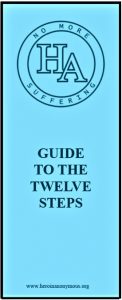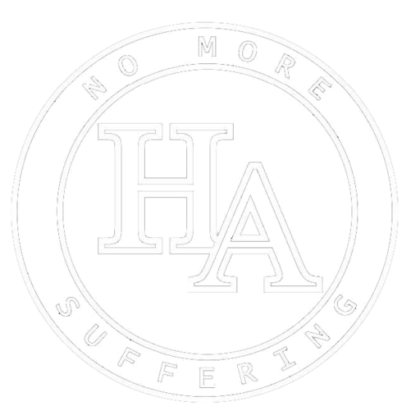GUIDE TO THE TWELVE STEPS

Taking the 12 Steps is what enables us to be free from the compulsion to use. We take the Steps as outlined in the book “Alcoholics Anonymous.” Often referred to as the “Big Book”, it contains specific, step-by-step instructions on how to practice the Steps in our daily lives. When reading this book, we found it helpful to substitute the word “heroin” for “alcohol”, and substitute the word “drinking” with “using.” The Steps show us how to live on a different basis. Our experience shows us that we cannot thoroughly nor honestly take the Steps on our own. This is where a sponsor comes in. A sponsor, grounded in the Steps themselves, can share their experience with the Steps and guide us to a way of living that is free from heroin addiction.
STEP ONE
We admitted we were powerless over heroin – that our lives had become unmanageable.
In the first half of Step One we are admitting powerlessness over two things: (1) Our mental obsession to use, which means we can’t control the obsession, that our attitude towards heroin is not normal, and we can’t stay sober on our own power and (2) We can’t stop once we put heroin into our bodies, we can’t predict what will happen when we use, and we have lost all control once we begin using. The second half of Step One is where we discover that we have been unable to manage our lives in a productive manner. If we were able to manage our own lives, we wouldn’t need to seek help for our addiction. Basically, the First Step tells us that we have no power to stay sober. This Step guarantees us that as long as we continue to rely on ourselves, we will use again. Without this admission of complete defeat, there is little desire to complete the remaining Steps.
STEP TWO
Came to believe that a Power greater than ourselves could restore us to sanity.
Once we have admitted complete defeat in Step One, we are ready to proceed with Step Two. In this Step we are being asked to believe in some kind of Power greater than ourselves. We can call this Power anything we choose, as long as it is more powerful than us. We can call it God, Buddha, Great Spirit, the Universe, the Quantum Field, or even Higher Power. It is our personal choice. This belief in some kind of power does not have to make sense to anyone else. It only has to make sense to us. The insanity in this Step refers to our thinking telling us we can safely use, that we can control our usage, or that we can manage our lives on our own power.
STEP THREE
Made a decision to turn our will and our lives over to the care of God as we understood Him.
Here we are being asked to turn our will and our life over to the care of some kind of power, over to a God of our understanding. Here we discover that conducting our lives in a selfish, self-centered fashion has not been very successful. We realize that this selfishness and self-centeredness is the root of our troubles. When we make this decision, we are admitted that we could no longer successfully run our lives on self-will. Now we are cared for and we will be guided and directed in a way that will free us from our heroin addiction. In this decision, we receive inspiration and new direction in a way that was before unimaginable. To make this crucial decision, we are being asked to follow it up with action. We cannot make a decision if we do not know what this decision looks like. To genuinely make this decision, we are making a commitment to complete the remaining Steps in their entirety.
STEP FOUR
Made a searching and fearless moral inventory of ourselves.
Now we are ready to examine all the things that have caused us failure and defeat and put them down on paper. This involves looking at our resentments towards others, identifying all of our fears, and listing the ways we have harmed others through our conduct. Written inventory is supposed to be uncomfortable. When we are honest about our defects of character, it is uncomfortable. This discomfort is a sign of our honesty. By admitting the wreckage of our selfishness and self-centeredness, we are on our way to freedom from our self-will and our addiction.
freedom from our self-will and our addiction.
STEP FIVE
Admitted to God, to ourselves, and to another human being the exact nature of our wrongs.
This is where we share our written inventory with another person. We are able to see ourselves much more clearly with the help of someone who has experience with conducting an honest self-evaluation. In this process, we discover the exact nature of our wrongs. They are the fears and self-delusions behind our character defects. We discover that our wrongs and defects are merely manifestations of our exact natures. By sharing it with another person, they are able to help us understand why we do what we do. There is generally a feeling of freedom when we uncover what has been causing us so much trouble. As a result of our honesty and willingness, we now begin to have a spiritual experience.
STEP SIX
Were entirely ready to have God remove all these defects of character.
In Step Six we are given the opportunity to thoroughly explore if we are truly ready to have all of these exact natures and defects of character eliminated. Knowing what they are, we can now be specific with what we are asking God to remove. We are also being asked to let God remove them. We have to be willing to participate in this process. If we are not willing to let God take them, Fie will not. It is essential that we admit that these are the very things that block us from God and the necessary power to stay sober. If we find ourselves resistive to letting go of some of them, we ask God to help us be willing.
STEP SEVEN
Humbly asked Him to remove our shortcomings.
Once we complete Step Six, we ask God to remove the defects of character that stand in the way of being useful to Him and others. We are not the ones that remove our defects. That is God’s work, not ours. In the meantime, that does not mean we do nothing. Knowing what it is that we are asking God to remove can motivate us to be considerate, honest, and thoughtful of others. This is how we can take an active role in improving our conduct.
STEP EIGHT
Made a list of all persons we had harmed and became willing to make amends to them all.
If our 4’h Step Inventory was thorough, our amends list will be found there. We simply put on paper all thepeople and institutions we have harmed and identify specifically how we hurt them. There may be others we have wronged that did not show up on our inventory. We list them also. By putting these people and the harm done on paper, there is no more guesswork and we know exactly where we stand on our amends.
STEP NINE
Made direct amends to such people wherever possible, except when to do so would injure them or others.
This is where we go out to others and clean up the wreckage of our past. Making amends is not an apology. To make these amends, we are admitting where we were wrong, and we are willing to make it right. We are not allowed to make amends at other’s expense so we can free ourselves of our guilt. This is where it is essential to receive guidance from someone who has experience in making amends in the proper way. It has also been our experience that addicts who do not complete all of their amends, use again. We need to keep in mind that this process is not done overnight. What is most important is that we are diligent in completing our amends.
STEP TEN
Continued to take personal inventory and when we were wrong promptly admitted it.
Step Ten involves taking a mental inventory of ourselves as we go through the day. Here we watch for resentment, dishonesty, selfishness, and fear. When they crop up, we ask God at once to remove them. Then at some point during the day we discuss them with another person and immediately make amends where it is appropriate. The last part of Step Ten is to turn our thoughts to someone we can help. This gives us perspective on our day and enables us to get out of ourselves by thinking of others. Practicing Step Ten on a regular basis reminds us we are human and we are going to make mistakes as we go along.
STEP ELEVEN
Sought through prayer and meditation to improve our conscious contact with God as we understood Him, praying only for knowledge of His will for us and the power to carry that out.
The Big Book gives specific instructions on how to conduct daily prayer and meditation. It also gives direction on how to do an evening review. By developing a daily meditation practice, and doing a nightly review regularly, we gain access to the necessary guidance and inspiration to do the proper thing at any time throughout our day. As a result of having such a regimen in our lives, we will know what to do, how to do it, and we will be improving our relationship with a God of our understanding.
STEP TWELVE
Having had a spiritual awakening as the residt of these steps, we tried to carry this message to heroin addicts, and to practice these principles in all our affairs.
The first part of Step Twelve implies we have completed the previous eleven Steps. In the second part, we are reminded that we are now in a position to work with other addicts. To carry this message simply means we are able to take others through the 12 Steps. There is no sponsor school. We learn to be sponsors by working with others. We simply share our experience, take others through the Steps in the way we were taken through them, and refer to the Big Book. The last part of Step 12 encourages us to practice these principles, which are the Steps! This Step illustrates that the entire program of Heroin Anonymous is based on one addict working with another addict in order to be free from heroin addiction. Without this practice, Heroin Anonymous could not exist and many more heroin addicts would continue to suffer.
